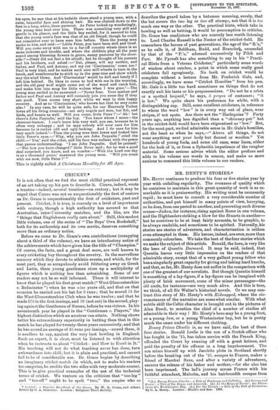CRICKET.*
IT is not often that we find the most skilful practical exponent of an art taking up his pen to describe it. Cicero, indeed, wrote a treatise—indeed, several treatises—on oratory ; but it may be urged that Cicero was not so unquestionably the first of orators as Dr. Grace is unquestionably the first of cricketers, past and present. Cricket, it is true, is scarcely on a level of importance with oratory, though a high authority has assured us that Australian, inter-University matches, and the like, are the "things that Englishmen really care about." Still, this modest little volume, one of the series of " The Boys' Own Bookshelf," both for its authorship and its own merits, deserves something more than an ordinary notice.
Before we come to Dr. Grace's own contributions (occupying about a third of the volume), we have an introductory notice of the achievements which have given him the title of "Champion." Of course, the facts, and a great deal more, are well known to every cricketing boy throughout the country. In the marvellous memory which they devote to athletic events, and which, for the most part, they so scrupulously avoid frittering away on Greek and Latin, these young gentlemen store up a multiplicity of figures which is nothing less than astonishing. Some of our readers may not be so well informed. These it will interest to know that he played his first great match (" West Gloucestershire v. Bedminster ") when he was nine years old, and that on that occasion he carried out his bat for 3 runs ; that he scored 51 for the West Gloucestershire Club when he was twelve ; and that he made 170 in the first innings, and 56 (not out) in the second, play- ing against the Gentlemen of Sussex, before he was sixteen. In his seventeenth year he played in the " Gentleman v. Players," the highest distinction which an amateur can attain. Nothing shows better his extraordinary superiority in batting than that in this match he has played for twenty-three years successively, and that he has scored an average of 45 runs per innings,—scored them, it is needless to say, against the very best bowling in England. Such an expert, it is clear, must be listened to with attention when he instructs us about "Cricket : and How to Excel in It." His teaching will not do what teaching never has done, turn awkwardness into skill; but it is plain and practical, and cannot fail to be of considerable use. Dr. Grace begins by describing an imaginary cricket-match (in which, not to make his readers too sanguine, he credits the two sides with very moderate scores). This is to give practical examples of the use of the technical terms of cricket. Wo venture on the criticism that " too-leg " and " too-off " ought to be spelt "two," the umpire who so x:grtTydri. iti=fildoticV{ Religions Tenet °the". describes the guard taken by a batsman meaning, surely, that the bat covers the two leg or two off stumps, not that it is too much one way or the other. The practical hints, which take in bowling as well as batting, it would be presumption to criticise. Dr. Grace has coadjutors who are scarcely less worth listening to. Lord Charles Russell is the Nestor of the cricket-field. He remembers the heroes of past generations, the age of the "B.'s," as he calls it, of Beldham, Budd, and Beauclerk, succeeded by that of the "P.'s," adorned successively by Pilch and Parr. Mr. Pycroft has also something to say in his " Practi- cal Hints from a Veteran Cricketer," particularly some words of wisdom about catches, a point in which some really good cricketers fail egregiously. No . book on cricket would be complete without a lecture from Mr. Frederick Gale, and, accordingly, we have some "Cricket Homilies" from his pen. Mr. Gale is a little too hard sometimes on things that do not exactly suit his taste or his prepossessions. "Do not be a zebra or a spotted leopard," he says, a, propos of costumes ; "it is low." We quite share his preference for white, with a distinguishing cap. Still, some excellent cricketers, in reference to whom the word " low " is in every way out of place, wear stripes, if not spots. Are there not the "Harlequins "? Forty years ago, anything less dignified than a "chimney-pot" hat in the cricket-field would have been stigmatised as "low." But, for the most part, we find admirable sense in Mr. Gale's homilies, not the least so when he says,—" Above all things, do not wear anything next your body but flannel or woollen." Yet hundreds of young fools, and some old ones, wear linen, either for the look of it, or from a Sybaritic impatience of the rougher material. Some serious advice which the editor prefixes and adds to his volume are words in season, and make us more anxious to commend this little volume to our readers.























































 Previous page
Previous page